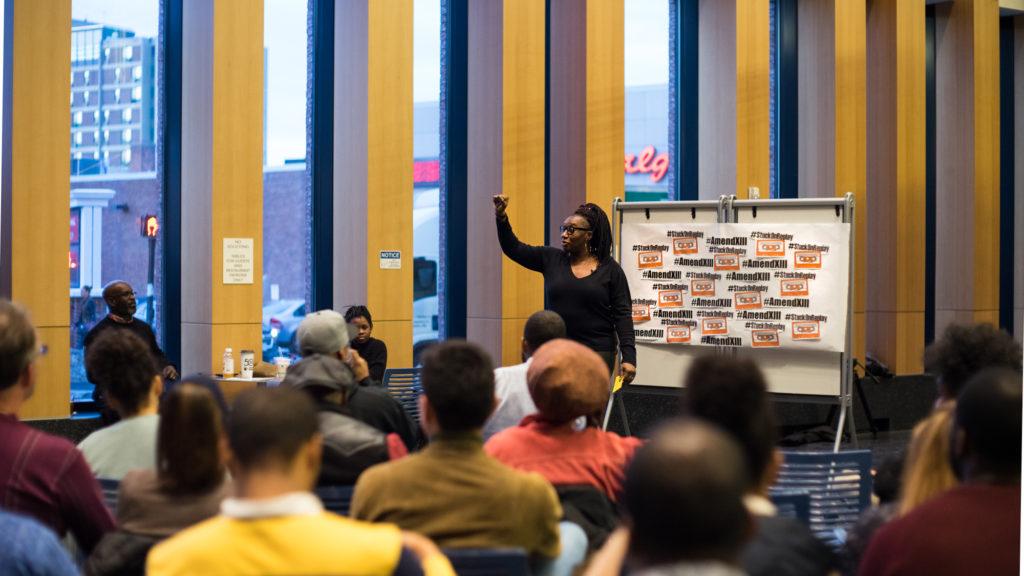By Jill Sojourner, news correspondent
The importance of community was present as dozens of people of varying ages, communities and professions gathered Saturday at Dudley Dough in Roxbury to propose plans to amend the 13th Amendment.
The free event, “AmendXIII,” was hosted by Stuck on Replay, an anti-mass incarceration group in Boston. They implemented dialogue, poetry and discussion to heighten awareness and gain support for the organization’s goal to create a replicable model in the state of Massachusetts to amend the 13th Amendment, which abolished slavery except as punishment for a crime. Stuck on Replay maintains that this exception clause contributed greatly to the mass incarceration of minorities in the United States.
James Mackey, founder of Stuck on Replay, reflected upon the importance of organizing collectively rather than individually.
“We are incarcerated in our own minds. It feels like because these institutions are so huge, when we fight as individuals it’s as if we’re already defeated and we give up,” Mackey said in an interview with The News. “But the thing that messes me up is that we can do it, but it’s about organizing collectively, so that’s why I felt this event was important.”
The event began with a phone call with Rickey McGee, Stuck on Replay’s internal liaison with Massachusetts Correctional Institution (MCI) – Norfolk, where he is imprisoned.
“Not only are we discontent with those who govern with or without our consent, but we demand to have an active say in the affairs that will realistically contribute to the social, political and economic narratives of our lives in this country,” McGee said.
He proceeded to expand upon the organization’s goals of combating institutionalized racism.
“Our goal is not centered upon shifting the perspective of those who hold insensitive racial biases, but to challenge the institutions and laws which, when exercised, have overtly discriminated against minorities in this country,” he said.
Yves Singletary, a training manager at the Department of Justice’s Defending Childhood Initiative, spoke about the importance of self-care in response to potentially triggering information pertaining to personal experiences with incarceration.
“We need to really think about how we’re being mindful about taking care of ourselves because this is a long battle that we have ahead and we need everybody to be together, to be energized,” Singletary said. “We’re a resilient people and we are going to make the changes that we’re looking for.”
Annie Jones, a Dorchester High School student, and Art Collins, a Boston poet, performed original spoken-word pieces, entitled “Quintessence of You” and “Eternal Slave,”respectively, with Jones performing on behalf of her older brother, Mike Jones, who was out of town.
Rick Henry of Massachusetts Community Action Network (MCAN), a Boston organization that works toward economic and racial justice. Boston engaged the audience in a group discussion about the meaning of the 13th Amendment, the exception clause and reasons as to why the amendment should be changed.
Attendees were divided into groups with the tasks of devising a “100-Day Action Plan” to amend the 13th Amendment in addition to identifying group members’ individual strengths and respective organizations.
Groups then presented, proposing multiple different ideas within their action plans, including social media campaigning, rallying, youth engagement, fundraising, petitioning and accountability for elected officials, among numerous other proposals.
“It’s very important to educate people to come together in the community to fight for our rights,” said Alisa Gill, an attendee from Brighton. “I just got out of prison […] and I think it’s great to educate children and people who don’t really understand the 13th Amendment.”
The Student Alliance for Prison Reform (SAPR), a Northeastern University student organization that works to spread awareness about injustice within the prison system has also worked to unpack the 13th Amendment, specifically its impact on prison labor.
“Prisoners are supposed to have human rights,” said Amelia Caramadre, a third-year health science major and president of SAPR. “We need to look into [whether or not] this is forced labor, is it cruel or unusual punishment, so are they definitely being forced to do this? Are they having pay or no pay? Are they being abused while they’re working?”
Caramadre described situations in which prisoners do work that is reminiscent of slave labor.
“The research that I’ve done and what we’ve looked at as a club has been prison plantations. In the south, prisons bought slave plantations, so [the prisoners] are actually out picking cotton or farming and the [Correctional Officers] are on horses, and that looks a lot like slavery, especially when most of the people there are black,” she said.
Mackey said he believes strongly in using the power of unity to create meaningful change.
“I believe in the power of people and that’s one of the things that a lot of people don’t think about,” he said. “They don’t believe in systems, they don’t believe in culture, they don’t believe in a whole lot of things. I believe in us as a people. I believe in the power of unity.”
Photo by Alex Melagrano









